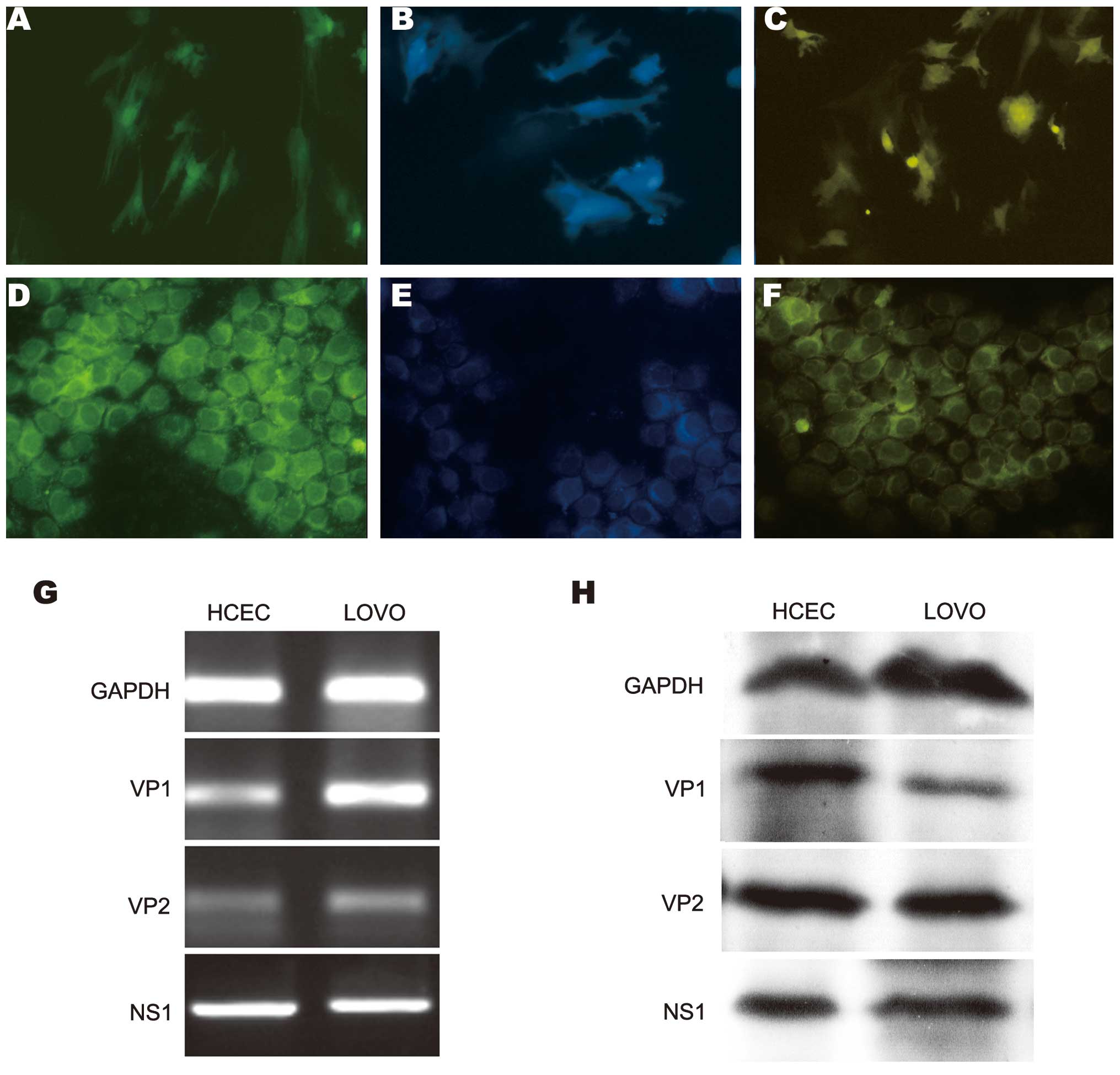|
1
|
Jemal A, Bray F, Center MM, et al: Global
cancer statistics. CA Cancer J Clin. 61:69–90. 2011.
|
|
2
|
Pagano JS, Blaser M, Buendia MA, et al:
Infectious agents and cancer: criteria for a causal relation. Semin
Cancer Biol. 14:453–471. 2004.
|
|
3
|
Newcomb PA, Bush AC, Stoner GL, et al: No
evidence of an association of JC virus and colon neoplasia. Cancer
Epidemiol Biomarkers Prev. 13:662–666. 2004.
|
|
4
|
Ricciardiello L, Laghi L, Ramamirtham P,
et al: JC virus DNA sequences are frequently present in the human
upper and lower gastrointestinal tract. Gastroenterology.
119:1228–1235. 2000.
|
|
5
|
Young NS and Brown KE: Parvovirus B19. N
Engl J Med. 350:586–597. 2004.
|
|
6
|
Li Y, Wang J, Zhu G, et al: Detection of
parvovirus B19 nucleic acids and expression of viral VP1/VP2
antigen in human colon carcinoma. Am J Gastroenterol.
102:1489–1498. 2007.
|
|
7
|
Kerr JR, Barah F, Cunniffe VS, et al:
Association of acute parvovirus B19 infection with new onset of
acute lymphoblastic and myeloblastic leukaemia. J Clin Pathol.
56:873–875. 2003.
|
|
8
|
Perreault N and Beaulieu JF: Use of the
dissociating enzyme thermolysin to generate viable human normal
intestinal epithelial cell cultures. Exp Cell Res. 224:354–364.
1996.
|
|
9
|
von Poblotzki A, Gigler A, Lang B, Wolf H
and Modrow S: Antibodies to parvovirus B19 NS-1 protein in infected
individuals. J Gen Virol. 76:519–527. 1995.
|
|
10
|
Huang da W, Sherman BT and Lempicki RA:
Bioinformatics enrichment tools: paths toward the comprehensive
functional analysis of large gene lists. Nucleic Acids Res.
37:1–13. 2009.
|
|
11
|
Huang da W, Sherman BT and Lempicki RA:
Systematic and integrative analysis of large gene lists using DAVID
bioinformatics resources. Nat Protoc. 4:44–57. 2009.
|
|
12
|
Livak KJ and Schmittgen TD: Analysis of
relative gene expression data using real-time quantitative PCR and
the 2(−Delta Delta C(T)) method. Methods. 25:402–408. 2001.
|
|
13
|
Doerig C, Hirt B, Antonietti JP and Beard
P: Nonstructural protein of parvoviruses B19 and minute virus of
mice controls transcription. J Virol. 64:387–396. 1990.
|
|
14
|
Raab U, Beckenlehner K, Lowin T, et al:
NS1 protein of parvovirus B19 interacts directly with DNA sequences
of the p6 promoter and with the cellular transcription factors
Sp1/Sp3. Virology. 293:86–93. 2002.
|
|
15
|
Momoeda M, Wong S, Kawase M, Young NS and
Kajigaya S: A putative nucleoside triphosphate-binding domain in
the nonstructural protein of B19 parvovirus is required for
cytotoxicity. J Virol. 68:8443–8446. 1994.
|
|
16
|
Moffatt S, Yaegashi N, Tada K, Tanaka N
and Sugamura K: Human parvovirus B19 nonstructural (NS1) protein
induces apoptosis in erythroid lineage cells. J Virol.
72:3018–3028. 1998.
|
|
17
|
Kajigaya S, Fujii H, Field A, et al:
Self-assembled B19 parvovirus capsids, produced in a baculovirus
system, are antigenically and immunogenically similar to native
virions. Proc Natl Acad Sci USA. 88:4646–4650. 1991.
|
|
18
|
Brown KE, Anderson SM and Young NS:
Erythrocyte P antigen: cellular receptor for B19 parvovirus.
Science. 262:114–117. 1993.
|
|
19
|
Ozawa K and Young N: Characterization of
capsid and noncapsid proteins of B19 parvovirus propagated in human
erythroid bone marrow cell cultures. J Virol. 61:2627–2630.
1987.
|
|
20
|
Saikawa T, Anderson S, Momoeda M, Kajigaya
S and Young NS: Neutralizing linear epitopes of B19 parvovirus
cluster in the VP1 unique and VP1–VP2 junction regions. J Virol.
67:3004–3009. 1993.
|
|
21
|
Rosenfeld SJ, Yoshimoto K, Kajigaya S, et
al: Unique region of the minor capsid protein of human parvovirus
B19 is exposed on the virion surface. J Clin Invest. 89:2023–2029.
1992.
|
|
22
|
Kawase M, Momoeda M, Young NS and Kajigaya
S: Most of the VP1 unique region of B19 parvovirus is on the capsid
surface. Virology. 211:359–366. 1995.
|
|
23
|
Lu J, Zhi N, Wong S and Brown KE:
Activation of synoviocytes by the secreted phospholipase A2 motif
in the VP1-unique region of parvovirus B19 minor capsid protein. J
Infect Dis. 193:582–590. 2006.
|
|
24
|
Zádori Z, Szelei J, Lacoste MC, et al: A
viral phospholipase A2 is required for parvovirus infectivity. Dev
Cell. 1:291–302. 2001.
|
|
25
|
Luo W and Astell CR: A novel protein
encoded by small RNAs of parvovirus B19. Virology. 195:448–455.
1993.
|
|
26
|
St Amand J and Astell CR: Identification
and characterization of a family of 11-kDa proteins encoded by the
human parvovirus B19. Virology. 192:121–131. 1993.
|
|
27
|
St Amand J, Beard C, Humphries K and
Astell CR: Analysis of splice junctions and in vitro and
in vivo translation potential of the small, abundant B19
parvovirus RNAs. Virology. 183:133–142. 1991.
|
|
28
|
Fan MM, Tamburic L, Shippam-Brett C,
Zagrodney DB and Astell CR: The small 11-kDa protein from B19
parvovirus binds growth factor receptor-binding protein 2 in vitro
in a Src homology 3 domain/ligand-dependent manner. Virology.
291:285–291. 2001.
|
|
29
|
Moffatt S, Tanaka N, Tada K, et al: A
cytotoxic nonstructural protein, NS1, of human parvovirus B19
induces activation of interleukin-6 gene expression. J Virol.
70:8485–8491. 1996.
|
|
30
|
Wan Z, Zhi N, Wong S, et al: Human
parvovirus B19 causes cell cycle arrest of human erythroid
progenitors via deregulation of the E2F family of transcription
factors. J Clin Invest. 120:3530–3544. 2010.
|















